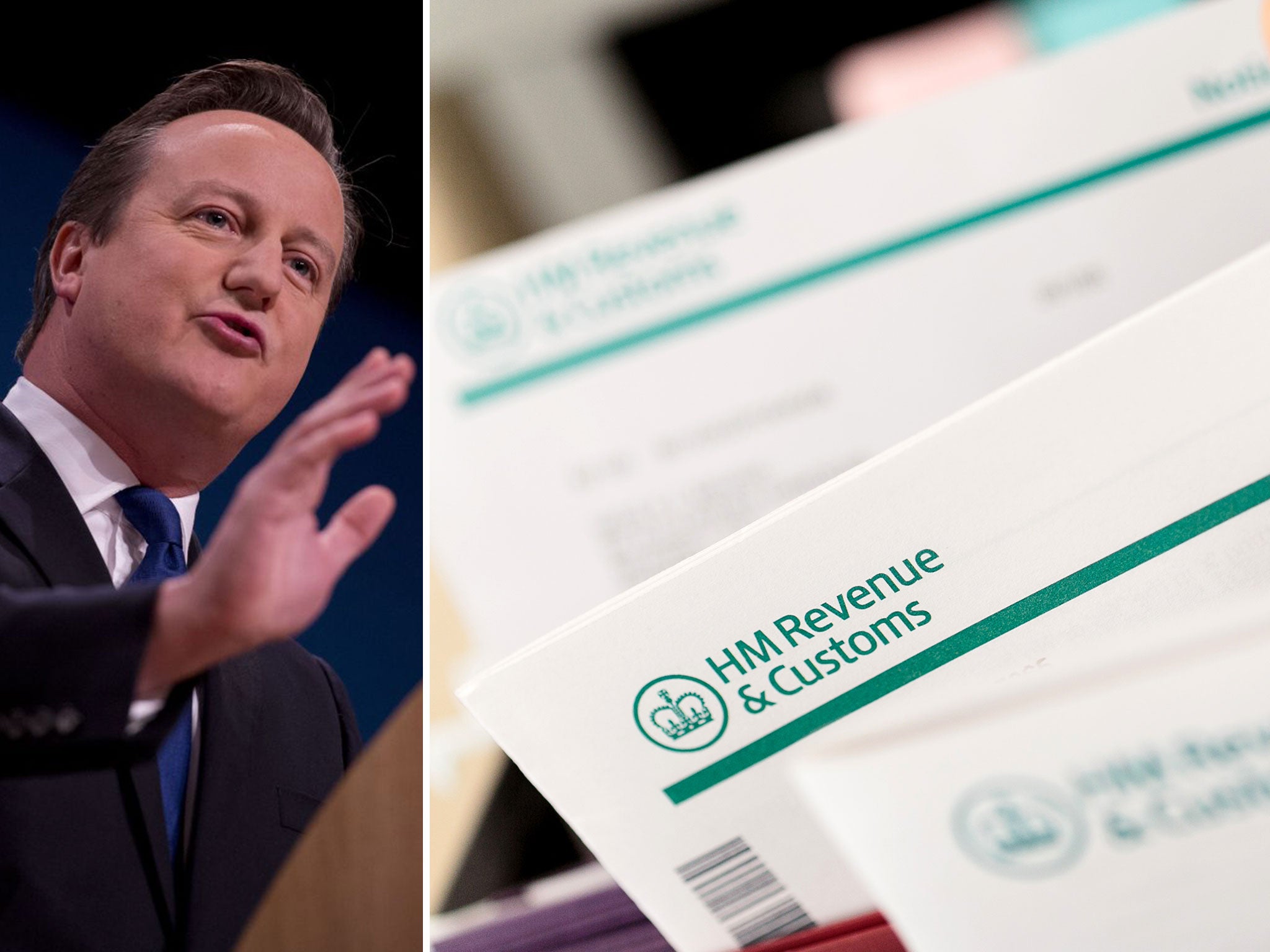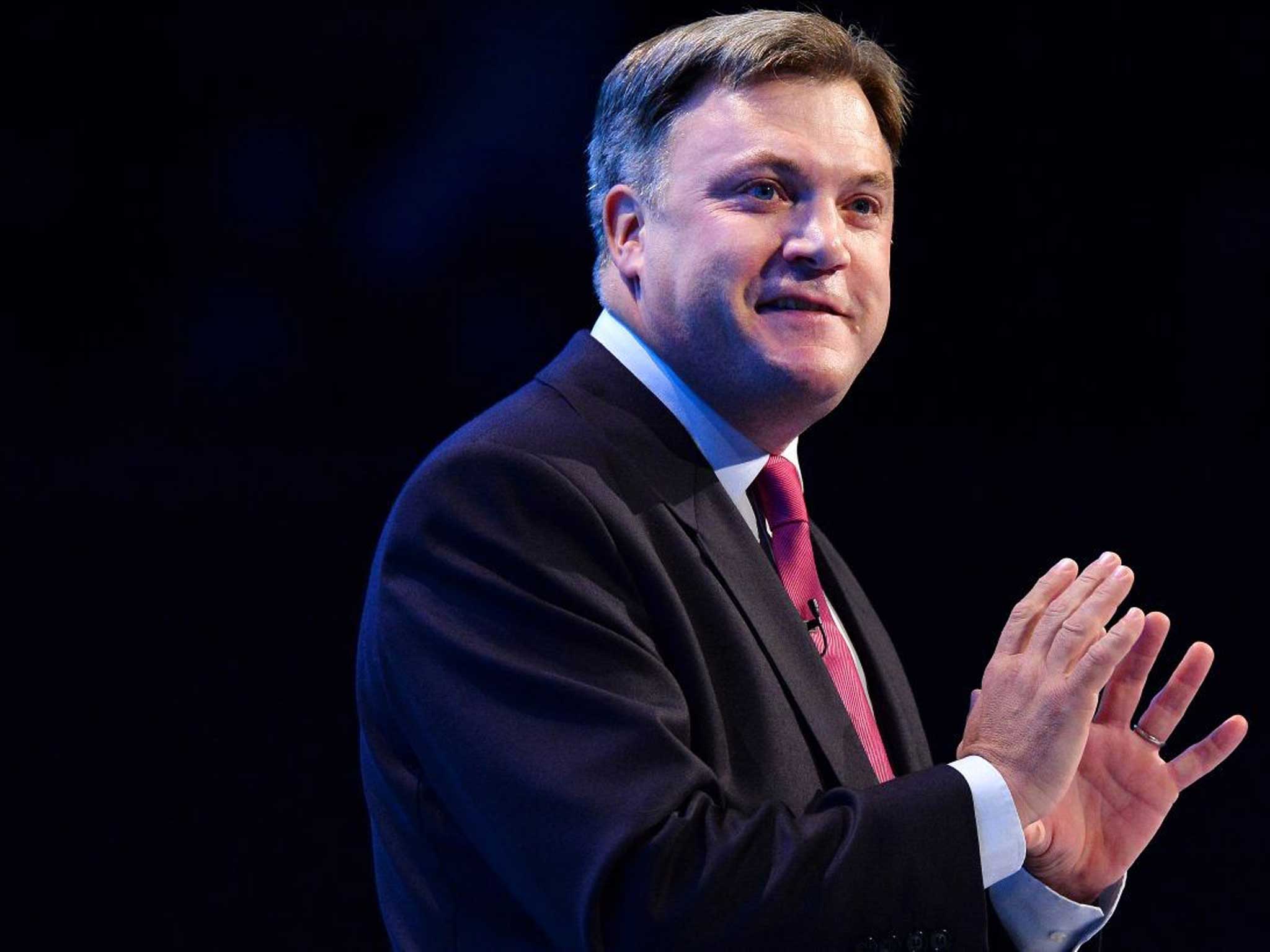Conservative Party conference: Cameron offers voters a 'tax giveaway' reward for austerity
Tory sources insisted the huge tax giveaway would be funded by the £25bn of spending cuts promised by George Osborne

Your support helps us to tell the story
From reproductive rights to climate change to Big Tech, The Independent is on the ground when the story is developing. Whether it's investigating the financials of Elon Musk's pro-Trump PAC or producing our latest documentary, 'The A Word', which shines a light on the American women fighting for reproductive rights, we know how important it is to parse out the facts from the messaging.
At such a critical moment in US history, we need reporters on the ground. Your donation allows us to keep sending journalists to speak to both sides of the story.
The Independent is trusted by Americans across the entire political spectrum. And unlike many other quality news outlets, we choose not to lock Americans out of our reporting and analysis with paywalls. We believe quality journalism should be available to everyone, paid for by those who can afford it.
Your support makes all the difference.David Cameron dangled £7.2bn of tax cuts in front of voters who have drifted away from the Conservative Party as he offered them a reward for the years of austerity.
Firing the starting gun for the general election in seven months, the Prime Minister said a Tory government would raise the personal tax allowance from £10,500 next April to £12,500 by 2020, cutting taxes for 30m people at a cost of £5.6bn and lifting 1m people out of the tax net.
He delighted the Tory conference by pledging to raise the earnings threshold for the 40p higher rate of tax from £42,285 in April to £50,000 in 2020, taking about 800,000 people out of the 40p bracket at a cost of £1.6bn.
By 2020, a typical basic rate taxpayer will pay £500 less in tax than today, while someone earning between £50,000 and £100,000 will pay £1,313 less.
Tory sources insisted the huge tax giveaway would be funded by the £25bn of spending cuts promised by George Osborne on Monday, including £12bn from welfare. But experts have previously warned that whoever wins power next May will need to raise taxes to balance the nation’s books.
Although Mr Cameron promised annual above-inflation rises for the NHS in England, that will mean 30 per cent cuts for several other Whitehall departments. The Labour-affiliated Fabian Society calculated that his speech would result in £40bn of cuts, including spending on children, schools, skills and science.
Tories claimed that many of the 5m people in work who would lose some tax credits under the Chancellor’s benefits squeeze would better off overall because of the tax cuts unveiled during the conference. But Mr Cameron had nothing to offer to those on benefits.
The Liberal Democrats, who have already pledged a £12,500 personal tax allowance by 2020, accused the Prime Minister of stealing the flagship policy they have forced the reluctant Tories to implement since 2010.
Danny Alexander, the Treasury Chief Secretary, said: “The Tories’ shameless attempt to copy Lib Dem tax policy will be utterly incredible to the millions of working people who they have made clear will be their main target for cuts in the next parliament.
"The Tory plan is based solely on spending cuts, mainly directed at the working age poor. And the Conservative plan to raise the higher rate threshold to £50,000 means that the working-age poor are being asked to fund a tax cut that is four times greater for higher rate taxpayers than for basic rate taxpayers.”

Mr Cameron’s dramatic gambit on tax will worry some Labour MPs, and ensures that tax and spending will be at the heart of the election.
But Ed Balls, the shadow Chancellor, said: “Nobody will be fooled by pie in the sky promises of tax cuts in six years' time when David Cameron cannot tell us where the money is coming from. Even the Tories admit this is an unfunded commitment of over £7bn, so how will they pay for it? Will they raise VAT on families and pensioners again?”
Gavin Kelly, chief executive of the Resolution Foundation think tank, said: “The 5m lowest paid workers don’t pay income tax so won’t gain at all from the proposals. It is surprising and disheartening that all three parties now favour further cuts to income tax while workers on as little as £8,000 are still paying national insurance. It’s hard to think of a sensible rationale for this lop-sided approach.”
In his closing speech to the Birmingham conference, Mr Cameron said: “We need tax cuts for hardworking people. So with us, if you work 30 hours a week on minimum wage, you will pay no income tax at all [by 2020]. The 40p tax rate was only supposed to be paid by the most well-off people in our country, but in the past two decades, far too many have been dragged into it - teachers, police officers.”
Staking his claim for another five years in Downing Street, Mr Cameron admitted: “I don’t claim to be a perfect leader. But I am your public servant, standing here, wanting to make our country so much better for your children and mine.”
He attacked Labour for accusing him of privatising the NHS, pointing to how his family relied on it to care for his son Ivan, who died aged six. “How dare they suggest I would ever put that at risk for other people’s children?” he asked.
Mr Cameron framed the election as “the choice” between himself and Ed Miliband, claiming Labour would take the country “back to square one” and to “economic disaster” rather than “finish the job” on the deficit.
Repeatedly saying he wanted to build “a Britain we are proud to call home,” Mr Cameron trailed the Tory manifesto for the next five years as he promised:
- Three million apprentices
- Full employment
- The most competitive corporate taxes in the G20
- Eliminating the budget deficit through spending cuts, not tax rises
- Building 100,000 new starter homes
- Letting people pass on their pension tax-free to their family when they die
- Ring-fencing NHS spending
- Renegotiating the EU’s “free movement” principle
- An in/out EU referendum in 2017
- Scrapping the Human Rights Act
- No income tax until people earn £12,500 [by 2020]
- No 40p tax rate until people earn £50,000 [by 2020]
Mr Cameron said: “If you want those things, vote for me. If you don’t, vote for the other guy.”
What he said... and what he meant
“I love this country – and my goal is this: To make Britain a country that everyone is proud to call home.”
Everyone apart from illegal immigrants, who are told to “Go Home” by Home Office vans, and British jihadis, to whom I said only a few paragraphs ago: if you have travelled to Syria or Iraq, we will use everything at our disposal to prevent you from coming back.
“We won’t just aim to lower youth unemployment; we aim to abolish it… getting off welfare and back to work.”
I’m stealing Labour language, Gordon Brown sound bites, by the digger-full, in broad daylight.
“Anyone should be free to take on different jobs so they can get on.”
Boris Johnson, for example: he wants to combine being Mayor of London, Daily Telegraph columnist and MP for Uxbridge and South Ruislip. I do hope he comes a cropper.
“When companies employ staff on zero-hours contracts and then stop them from getting work elsewhere, that’s not a free market – it is a fixed market. In a Britain that everyone is proud to call home, people are employed, they are not used. Exclusive zero-hours contracts that left people unable to build decent lives… we will scrap them.”
Driving the fork-lift truck, emptying the warehouse of Labour rhetoric one crate at a time.
“Tristram Hunt and I might both have been educated at some of the best schools… But here’s the difference: You, Tristram – like the rest of the Labour Party – want to restrict those advantages. I want to spread them to every child in Britain.”
One of my favourite subjects at Eton was brass neck studies. But Tristram went to University College School, where they teach boring stuff such as social responsibility.
“We’re at a moment where all the hard work is finally paying off, and the light is coming up… Go back now and we’ll lose all we’ve done, falling back into the shadows when we could be striding into the sun. That’s the question next May. Do you want to go back to square one – or finish what we’ve begun?”
Bring me sunshine. Cue “Don’t Stop” by Fleetwood Mac, because it was Bill Clinton’s 1992 campaign song, not because it is a happy-sounding song about a marriage break-up.
John Rentoul
Join our commenting forum
Join thought-provoking conversations, follow other Independent readers and see their replies
0Comments